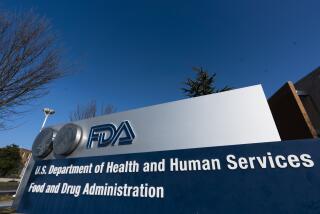Cholesterol Drugs’ Safety Questioned by Researchers
- Share via
The world’s most widely used cholesterol-lowering drugs cause cancer in laboratory animals, UC San Francisco researchers say in a hotly disputed new study warning that the drugs may also cause cancer in human beings.
The researchers’ analysis covered two broad classes of anti-cholesterol medications, the so-called statins and fibrates. Among them are the industry-leading lovastatin, or Mevacor, and gemfibrozil, or Lopid.
Delving into drug-testing data in the Physicians’ Desk Reference, Food and Drug Administration records and other sources, the researchers say they found what one of them called “underdiscussed” evidence that mice and rats develop tumors in response to large doses of the drugs.
While the FDA approved the drugs years ago, their cancer-causing potential has been neglected in part because they reduce heart-disease deaths so effectively in people who have had a heart attack or who have extremely high blood cholesterol levels, the researchers say.
“We have to be careful about getting so enthusiastic about drug treatment that we say these things are wonderful and everyone should be on them,” said Dr. Thomas Newman of UC San Francisco, who wrote the paper with Dr. Stephen Hulley. It appears in today’s Journal of the American Medical Assn.
In an unusual move, the same issue of the AMA journal carries an editorial disputing the new analysis. It says that laboratory rodents are more susceptible to cancer than people are, that the drugs were tested at extremely high doses never encountered by people, and that large clinical trials of the drugs have failed to turn up an excess of cancer.
“If treatment with drugs . . . to lower cholesterol levels does cause cancer, the actual excess risk of [dying of cancer] is remote,” wrote Drs. James Dalen and William Dalton of the University of Arizona College of Medicine. They said the UC San Francisco researchers “have not presented convincing evidence that cholesterol-lowering by diet or drugs increases the risk of cancer deaths.”
Dr. Jonathan Tobert, who holds the title of distinguished senior physician at Merck & Co., which produces two statin drugs, Mevacor and Zocor, criticized the study. “I think that it might be counterproductive in that it might frighten people who should be taking the drugs,” he said.
To be sure, the UC San Francisco researchers do not question that cholesterol-lowering drugs benefit many people, including those who have had a heart attack and those with definite heart disease, extremely high cholesterol levels or another factor like diabetes that puts them at high risk of heart disease in the near future.
“We would like people who are at relatively high short-term risk of coronary heart disease to be vigorously treated,” Hulley said. The statin drugs, he said, “are very good at reducing mortality” among such people. “And that benefit greatly outweighs the hypothetical long-term adverse effects.”
“I think the real problem is undertreatment, not overtreatment,” Tobert said. Only about a third of Americans who have had a heart attack, he said, are currently taking a cholesterol-lowering drug.
The UC San Francisco researchers said what worries them is that perhaps hundreds of thousands of young and middle-aged adults without actual heart disease, but with only moderately elevated blood cholesterol levels, will be taking those drugs for years. And for them, the potential benefit--avoiding a future heart attack--is not clear, and does not necessarily outweigh the risks.
“We think it’s probably not prudent for such people to be using statin drugs,” Hulley said, “because of the possibility that the rodent studies raise of adverse effects decades later.”
Other medical researchers agree with that approach. “I think we should be extremely cautious in using” the statin drugs, said David Jacobs, an epidemiologist at the University of Minnesota School of Public Health. He, too, said that people at high risk of heart disease are likely to benefit from the drugs, while people at lower risk--whose only risk factor is a total cholesterol level between, say, 220 and 300--may want to avoid the drugs until the long-term side effects are better understood.
Studies involving rats and mice are always difficult to interpret and are subject to controversy. In one study from the Physicians’ Desk Reference publicized by the UC San Francisco researchers, mice developed more than the expected number of liver tumors when the animals received lovastatin for two years at a dose more than 300 times what a human being would take.
But Hulley and Newman argue that that is not as unreasonable as it might seem. For one thing, the mice were exposed for only two years, whereas a person might take such a drug for decades. More important, such drugs pass through the animals so quickly, the researchers say, that a mouse given 300 times what a person ingests actually has only three to four times as much in its bloodstream as a person taking the standard dose.
Merck’s Tobert pointed out that some of the digestive-system tumors that occurred in rodents have no correlate in people. Some rats developed tumors of the stomach lining, but humans don’t have the same tissue, he said.
At the same time, as the Arizona researchers point out in their editorial, chemicals that give mice tumors don’t always affect human beings similarly. They cite research on substances found in coffee. Of 26 substances in coffee tested on rodents, 19 were found to cause cancer, and yet there is no evidence from the huge numbers of people who expose themselves to coffee every day that the beverage causes cancer. Rodent bioassays, they say, do not necessarily “reflect true risks.”






